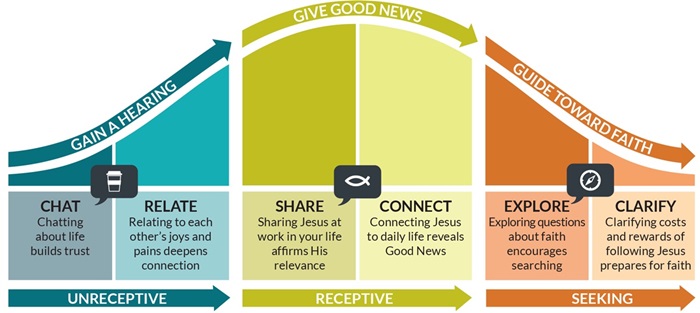The Beauty of Spiritual Conversations
The Reluctant Witness explores why Christians don’t share their faith and how they can do so better
There is something delightful about spiritual conversations,” writes Don Everts in The Reluctant Witness. Scripture seems to agree. “How beautiful are the feet of those who bring good news!” (Romans 10:15) is the way Paul puts it, quoting Isaiah 52:7. Can anyone not smile in response to a friend saying, “I have good news”? I doubt it.
And yet, spiritual conversations strike many Christians as “pesky, painful, awkward things,” as Everts puts it. He defines a spiritual conversation as “any conversation about spiritual or faith matters (including doubts) with anyone.” That broad definition includes, but is not limited to, evangelistic conversations. It is those conversations that many find pesky, painful and awkward.
In The Reluctant Witness, Everts considers why this might be the case and shows how spiritual conversations, including evangelism, can be more authentic. The book is based on research conducted by the Barna Group in cooperation with Lutheran Hour Ministries, which Everts serves as content manager. It is the first of three collaborative projects focused on “how Americans are expressing their faith.”
So, why aren’t Christians engaging in spiritual conversations? Everts points to “the silencing effect of fear,” specifically, the fear of giving offense. “Our culture is increasingly secular (less and less colored by our Christian heritage) and more and more relativistic (looking down on exclusive truth claims),” he writes. “In this postmodern context, the idea of attempting to convert someone else to your own faith is seen as religiously extreme by most Americans.”
There is a better way to talk about spirituality and share the Christian faith.
More is going on than just fear, however. Christians also don’t engage in spiritual conversations because they subscribe to a number of myths about them. Spiritual conversations, so the story goes:
- take place in special places, during special moments, by special people;
- are serious and sober events;
- require that the Christian be able to give the right answers;
- involve conflict, which ruins everything;
- are burdensome duties that are, in the end, painful and regrettable.
If that’s what evangelism requires, it’s no surprise that the average American Christian chooses to be a “reluctant witness,” in the words of the book’s title.
Here’s the crucial point, however: Neither spiritual conversations generally nor evangelistic ones specifically have to live down to the myths. There is a better way to talk about spirituality and share the Christian faith.
“Eager conversationalists,” as Everts calls them, practice four habits on a regular basis. First, they “look for and expect spiritual conversations in everyday life.” They look for “God moments,” in other words, defined as “a moment when we see God actively at work in the people around and sense God is opening a door for us to be a part of his work in their life.”
Second, they “pursue and initiate spiritual conversations.” Everts denies that this means “awkwardly inserting Christian non sequiturs into conversations,” giving this example: “Speaking of your new car, if you were hit by a bus tonight, do you know where you would spend eternity?” It’s a good question, but a canned one, one that feels inorganic and unauthentic. Instead of making hard, awkward transitions like that, eager conversationalists explore “tentative, hopeful moments in a conversation,” such as when people begin to ruminate about larger issues and deeper feelings.
Interestingly, these conversations are impactful. Thirty-five percent of “all adults in America claim they have personally made a ‘big change’ in their life because of a conversation about faith,” according to Everts. Fear silences, but genuine spiritual conversations help people change.
Third, eager conversationalists are “open to sharing their faith in a wide variety of ways.” This openness takes into account whether our conversation partners’ spiritual posture is “unreceptive,” “receptive,” or “seeking.” In turn, our “prayerful response” to them seeks to “gain a hearing,” “give good news,” or “guide toward faith,” respectively. Depending on the relationship dynamic, our conversation may take one of six forms: “chat,” “relate,” “share,” “connect,” “explore,” or “clarify.” Lutheran Hour Ministries calls this dynamic the “Spiritual Conversation Curve.” (See figure below.)

Finally, eager conversationalists “gently push through the awkward moments” in spiritual conversations. The deeper a conversation goes, the more likely “tension or conflict” will surface. It is tempting to bail on spiritual conversations (or on any other deep conversation) when this happens. As Beau Crosetto has pointed out, “right after some of the initial tension is released, some kind of breakthrough comes, whether in the other person, in us or in the conversation.” So, keep talking!
The Reluctant Witness is a short book that can be read in a single sitting. But Everts uses words wisely, quickly and memorably, addressing why Christians don’t engage in spiritual conversations more and how they can do so better. Its advice is data-driven, Bible-grounded and road-tested, and well worth reading if you’re a pastor or church leader, or just a Christian interested in better sharing your faith.
 Book Reviewed
Book Reviewed
Don Everts, The Reluctant Witness: Discovering the Delight of Spiritual Conversations (Downers Grove, IL: IVP Books, 2019).
Influence Magazine & The Healthy Church Network
© 2026 Assemblies of God

